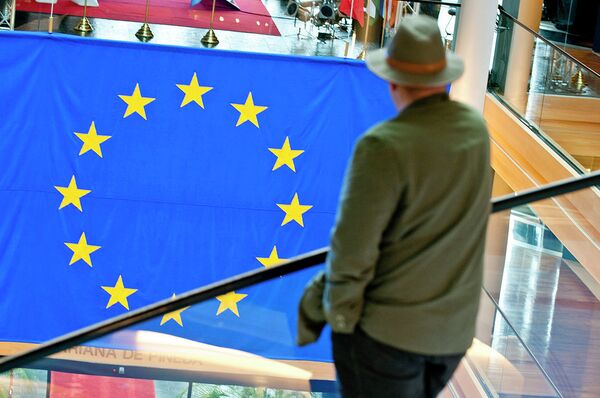MOSCOW, May 26 (RIA Novosti), Daria Chernyshova – Economic turbulence in Europe and austerity measures have worked to strengthen nationalist sentiments among the peoples of the EU member states, Vernon Bogdanor, professor of government at King's College in London told RIA Novosti.
“The economic collapse in 2008 and the Eurozone crisis have strengthened nationalism,” Bogdanor said. “Modern socialist parties hoped that the Eurozone crisis and collapse of neo-liberalism would encourage social democracy but in practice it encouraged nationalism. So that’s the main effect of the election.”
Far-right and Euroskeptic parties have gained momentum and are winning in European Parliament elections. Early results indicate they won in France, the UK, Denmark and Austria. The parliamentary vote lasted for several days, and there are 751 seats from 28 countries up for grabs.
“All the pro-European parties are suffering because there is a general disillusionment with the European project,” Bogdanor said. “People in Greece, in Spain, in Italy blame the Eurozone for austerity, for their economic troubles. So there is a reaction against it. You also have a reaction from more prosperous countries like Poland and Hungary, so there is a general disenchantment,” he added.
Bogdanor noted however that the so-called Euroskeptic parties have different flavors.
“The first is the British Conservative party which is a perfect democratic party, party of government that wants to stay in Europe and reform it,” he said.
“Then you have the small, alternative für Deutschland party in Germany which wants to keep Germany in the EU, but Germany to leave the Eurozone. UKIP in Britain wants Britain to leave the EU entirely. Front National in France, which Nigel Farage – leader of the UKIP – refused to work with saying it is racist. It is really fascist party, I think,” Bogdanor told RIA Novosti.
Marine Le Pen’s Front National wants to cooperate with more extreme parties, such as Golden Dawn in Greece, Jobbik in Hungary and the neo-Nazi NPD Party in Germany. “They are really neo-Nazi parties and this is really disturbing result of the elections – the rise of Nazism, fascism. But what we have seen in Central and Eastern Europe, and of course in Ukraine – is the rise of nationalism,” Bogdanor said.
The elections results pose questions about the viability of the European project. And the leaders of the EU member states need to listen carefully to what their people are saying, the professor said.
“The project is viable if the leaders are taking notes of what the people are saying. Perhaps a looser Europe, perhaps fewer countries in the Eurozone, without pretention to becoming an integrated union, perhaps more like a free trade area or more open Europe – that would be viable,” he said.
Commenting on the results of the elections, British Prime Minister David Cameron said he took “a very clear message from this election: people are deeply disillusioned … they want change. That message is received and understood.”
German Chancellor Angela Merkel expressed regret that the populist parties had done well in the elections and called on her counterparts to set conditions to win over voters.
“The question is how we win over voters. This is also the case for France. I think a course that focuses on competitiveness, growth and jobs is the best answer to the disappointment,” Merkel said.




